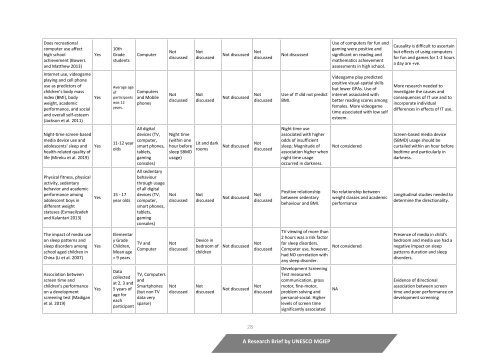Screen Time and Learner Well-being
The Debate, the Evidence and Directions for Future
The Debate, the Evidence and Directions for Future
Create successful ePaper yourself
Turn your PDF publications into a flip-book with our unique Google optimized e-Paper software.
Appendix II: Analytical foci <strong>and</strong> key conclusions of the studies covered in the present review<br />
Factor→<br />
Study↓<br />
Evidence<br />
/Data<br />
Sample<br />
Devices<br />
Timing of<br />
Usage<br />
Environment<br />
of Usage<br />
Purpose of<br />
Usage<br />
Content of<br />
Media<br />
Impact on Health<br />
Impact on Learning<br />
Conclusion/<br />
Message<br />
<strong>Screen</strong> time <strong>and</strong> sleep<br />
among school-aged<br />
children <strong>and</strong><br />
adolescents: a<br />
systematic literature<br />
review (Hale <strong>and</strong> Guan<br />
2014)<br />
Yes<br />
5-17 year<br />
olds<br />
All digital<br />
devices (TV,<br />
computer,<br />
smart phones,<br />
tablets,<br />
gaming<br />
consoles)<br />
Night time<br />
Not<br />
discussed<br />
Not discussed<br />
Not<br />
discussed<br />
<strong>Screen</strong> time across<br />
different devices <strong>and</strong> on<br />
a consistent basis<br />
adversely associated<br />
with sleep outcomes but<br />
causal association not<br />
confirmed<br />
Not considered<br />
More studies necessary<br />
Systematic review of<br />
sedentary behaviour<br />
<strong>and</strong> health indicators in<br />
school-aged children<br />
<strong>and</strong> youth: an update<br />
(Carson et al. 2016)<br />
Yes<br />
5-17 year<br />
olds<br />
All digital<br />
devices (TV,<br />
computer,<br />
smart phones,<br />
tablets,<br />
gaming<br />
consoles)<br />
Not<br />
discussed<br />
Not<br />
discussed<br />
Not discussed<br />
Not<br />
discussed<br />
Higher durations of<br />
screen time associated<br />
with unfavourable body<br />
composition,<br />
cardiometabolic risk,<br />
unfavourable social<br />
behavior, low fitness<br />
<strong>and</strong> low self esteem.<br />
Higher duration of TV viewing<br />
associated with lower<br />
academic achievement but<br />
quality of evidence marked as<br />
'very low'.<br />
Overall quality of evidence in<br />
this review: low to moderate.<br />
Higher quality <strong>and</strong> strong<br />
studies required to confirm<br />
primarily observational<br />
evidence.<br />
Effects of screen time<br />
on health <strong>and</strong> well<strong>being</strong><br />
of children <strong>and</strong><br />
adolescents : a<br />
systematic review of<br />
reviews (Stiglic <strong>and</strong><br />
Viner 2019)<br />
Yes<br />
0-18 year<br />
olds<br />
TV, Computers<br />
<strong>and</strong><br />
Smartphones<br />
(but non TV<br />
data very<br />
sparse)<br />
Not<br />
discussed<br />
Not<br />
discussed<br />
Not discussed<br />
Not<br />
discussed<br />
Strong indication of<br />
negative effects of<br />
screen time on health.<br />
Low quality/poor evidence<br />
that greater screen time was<br />
associated with poorer<br />
educational attainment.<br />
Moderate quality evidence for<br />
harmful effects of screen time<br />
on cognition among infants.<br />
Strong evidence for correlation<br />
between screen time adiposity,<br />
unhealthy diet, depressive<br />
symptoms <strong>and</strong> quality of life.<br />
Weak evidence that small<br />
amounts of daily screen time<br />
may have some benefits.<br />
Associations between<br />
screen use <strong>and</strong> child<br />
language skills: A<br />
systematic review <strong>and</strong><br />
meta-analysis (Madigan<br />
et al. 2020)<br />
Yes<br />
Average<br />
age of<br />
participant<br />
s was 12<br />
years<br />
All <strong>Screen</strong><br />
Based Devices<br />
primarily TV<br />
<strong>and</strong> Mobile<br />
Phones<br />
Not<br />
discussed<br />
Co-viewing<br />
with<br />
Parents<br />
considered<br />
For<br />
Educational<br />
<strong>and</strong><br />
Entertainment<br />
Purposes<br />
Educational<br />
<strong>and</strong> Non<br />
Educational<br />
(both)<br />
Impact on Language<br />
Skills<br />
Greater Quantity of screen<br />
use associated with lower<br />
language skills but<br />
educational programs <strong>and</strong> coviewing<br />
associated with<br />
stronger language skills<br />
Limit exposure to screen time,<br />
select high quality programmes<br />
for viewing <strong>and</strong> co-view with<br />
parents when possible<br />
A meta-analysis of the<br />
effect of media devices<br />
on sleep outcomes<br />
(Carter et al. 2016)<br />
Yes<br />
6 - 19 year<br />
olds<br />
All <strong>Screen</strong><br />
Based Devices<br />
primarily TV<br />
<strong>and</strong> Mobile<br />
Phones<br />
Discussion<br />
on nighttime<br />
usage<br />
Not<br />
discussed<br />
Not discussed<br />
Not<br />
discussed<br />
Bedtime media device<br />
usage associated with<br />
inadequate sleep<br />
quantity, poor sleep<br />
quality, <strong>and</strong> daytime<br />
sleepiness<br />
Not considered<br />
Age specific guidance for<br />
screen based media device<br />
usage <strong>and</strong> parent led initiatives<br />
to reduce access <strong>and</strong> use in<br />
collaboration with health<br />
providers <strong>and</strong> teachers.<br />
Cross-sectional study of<br />
use of electronic media<br />
by secondary school<br />
students in Bangkok,<br />
Yes<br />
Adolescents<br />
(secondary<br />
grade<br />
students)<br />
All digital<br />
devices (TV,<br />
computer,<br />
smart phones,<br />
Not<br />
discussed<br />
Not<br />
discussed<br />
Not discussed<br />
Not<br />
discussed<br />
Not discussed<br />
Use of devices not related to<br />
academic performance. As<br />
they age adolescents tend to<br />
spend more time engaged in<br />
Longitudinal studies with<br />
precise time logs of device<br />
usage <strong>and</strong> description of type<br />
of content required to<br />
26<br />
A Research Brief by UNESCO MGIEP

















